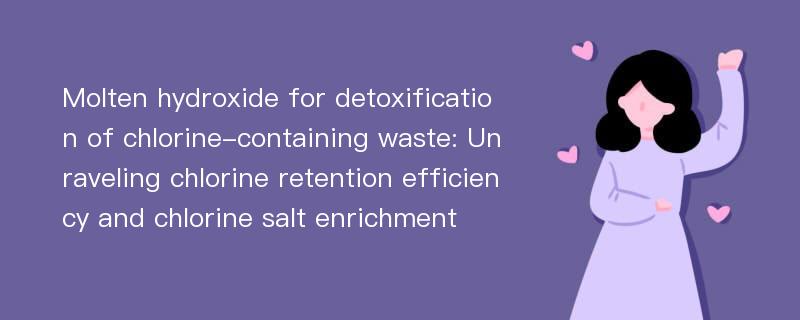
论文摘要
Hazardous waste dechlorination reduces the potential of creating dioxins during the incineration process. To investigate the salt effect on waste dechlorination, molten hydroxides with a low melting temperature were utilized for the pre-dechlorination and decomposition of chlorine-containing organic wastes(COWs) including trichlorobenzene(TCB),perchloroethylene, hexachlorobenzene and chlordane. The results showed that a eutectic mixture of caustic sodium and potassium hydroxides(41 wt.% NaOH and 59 wt.% KOH) led to a low melting point below 300°C and a relatively high chlorine retention efficiency(CRE) with TCB as a representative COWs. The amounts of hydroxides, reaction time, and temperature all had notable influence on CRE. When the mass ratio of hydroxides to TCB reached 30:1,approximately 98.1% of the TCB was destroyed within 2.5 hr at 300°C with CRE of 71.6%.According to the residue analysis, the shapes of reaction residues were irregular with particles becoming swollen and porous. The benzene ring and C–Cl bonds disappeared, while carboxyl groups formed in the residues. The stripped chlorine was retained and condensed to form chloride salts, and the relative abundance of the chloride ions associated with the mass of TCB in residues increased from 0 to 75.0% within the 2.5 hr reaction time. The observed concentration of dioxins in residues was 5.6 ngTEQ/kg. A reaction pathway and possible additional reactions that occur in this dechlorination system were proposed. Oxidizing agents may attack TCB and facilitate hydrogenation/dechlorination reactions, making this process a promising and environmentally friendly approach for chlorine-containing organic waste treatment.
论文目录
文章来源
类型: 期刊论文
作者: Shijin Dai,Yilin Zheng,Youcai Zhao,Yu Chen,Dongjie Niu
来源: Journal of Environmental Sciences 2019年08期
年度: 2019
分类: 工程科技Ⅰ辑
专业: 环境科学与资源利用
单位: College of Environmental Science and Engineering, Tongji University,Shanghai Institute of Pollution Control and Ecological Security
基金: supported by the National Natural Science Foundation of China(No.21677112),the Science and Technology Program of Ministry of Housing and Urban–Rural Development(No.2015-K7-021)
分类号: X592
页码: 192-202
总页数: 11
文件大小: 1060K
下载量: 15
